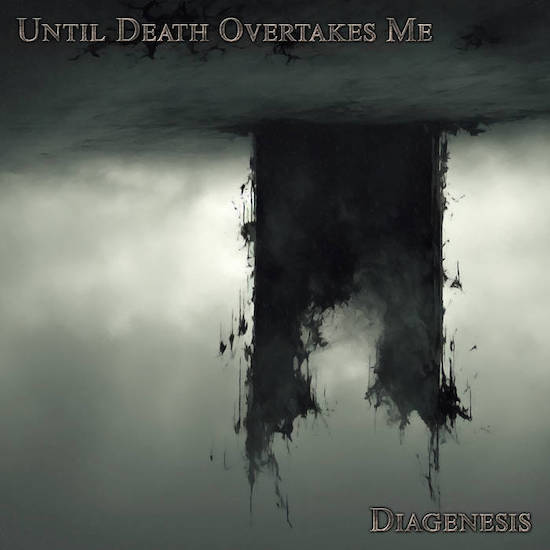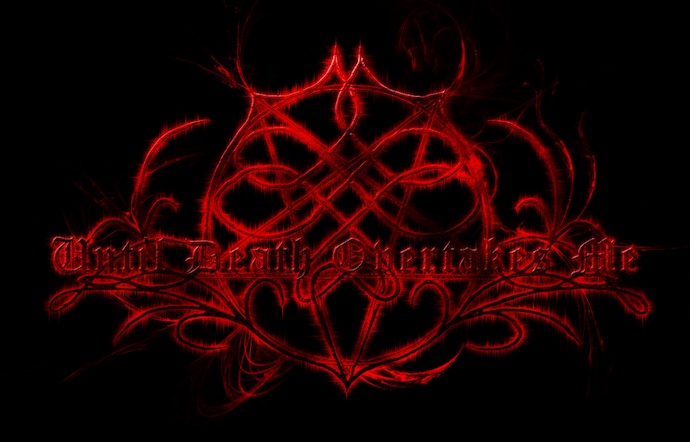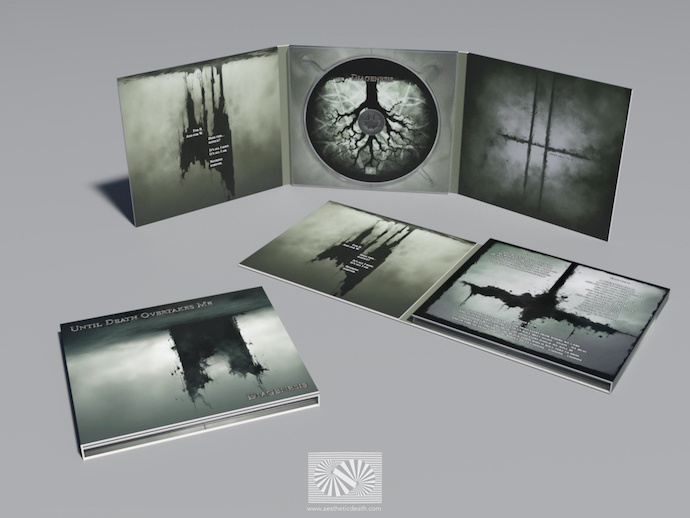
(written by Islander)
No matter how “niche” they may be, every genre of extreme metal includes variations on the themes that give them their names. That’s why, as time has passed, most of them have been categorically sub-divided, with an ever-increasing use of hyphenated naming conventions.
Few genres are more “niche” than funeral doom. No doubt, it has intensely devoted fans, but, with very rare exceptions, it has never been “popular” and probably never will be. In the imagination of most listeners, the music is too slow, too superficially simple, too appallingly bleak, and usually with track lengths that are too long for anything remotely approaching mass consumption.
Yet even in such a niche genre variations abound, though its popular reach is so limited that people haven’t reached very far for hyphenated or slashed sub-conventions. That doesn’t mean we can’t try, and for the sheer hell of it we will try to find one that suits Diagenesis, the latest album by the mysterious Belgian entity Until Death Overtakes Me which we’re premiering today in advance of its December 6 release by Aesthetic Death.

This particular entity has been around for a very long time, and with the exception of a five-year period of inactivity beginning in 2011, it has released a new album every year or two since 2000. This latest one is UDOM‘s third album in three years.
Among the aspects of UDOM‘s approach that have become entrenched is the eloquence of its tortured philosophies. Here is part of what we have regarding the thematic conception of the new album:
Diagenesis explores how bereavement may turn into guilt with the passing of time due to the failings of one’s own mind.
Memories of the dead make it seem they can still communicate with the living, offering a warning of what is to come. All that they were has been surrendered to the minds of those left behind. They’ve become dreams and memories, and they’re aware of the nebulous nature of their new existence. While they accept their state, it’s much harder on the living, who see the images in their mind lose more and more detail.
The self-imposed task of remembering becomes an impossible burden. Realising that forgetting is inevitable, guilt sets in, growing stronger to the point it seems the only force capable of offering forgiveness may be death itself.
And so the lament for the dead serves the living just as well.
And we also have this:
“Diagenesis“. The final act of the dead. To become one with the surroundings whence they came, to become indistinguishable from the rest of reality, and effectively, to vanish as if they’d never existed. To leave the living despairing with the knowledge that no matter how deep they dig, in earth and mind, the dead shall never be found again.
Bereavement ravages the mind, and time promises to blunt its strength. A pale wasteland may recover one day, but the guilt that comes with fading memories takes root instead.
And here, time only strengthens it. As clear images become abstract dreams, guilt bears down with its growing, crippling mass.
The only ones to understand, who could ever forgive, have already gone ahead, and are those same ones fading out of view.
And when they’re truly gone, only death may forgive.

In exploring these bleak and haunting themes UDOM‘s new album consists of only four songs, each of them very long, and the differences among them are subtle at best.
As you might expect, the pacing is slow; the admittedly overused word “glacial” comes to mind. The music also includes contrasting sensations, and the contrasts are often striking.
In “Ascension” the contrasts include gothic organ melodies whose quivering resonance is ethereal, but also slow, heavily distorted chords that are ruinously abrasive. One seems like the sonic equivalent of starshine, the other like the excavation of granite. One is beautiful, reverent, and spellbinding; the other crushing and cruel, trailing vibrations that resemble Geiger counters surrounded by plutonium. They both seem cold, in dramatically different ways.
In “End’s Lure” the mournful sounds of classical strings take the place of those organ melodies. Their presence is more beleaguered and haunting than the ethereal movements in “Ascension“, more distressed and less wondrous, though the melodies here also rise and shimmer, elegantly elevating above the ruthless gouging, clawing, and pounding below.
Among the contrasts, the songs further include dynamiting percussive blows right in your face, but also other low-frequency throbs that are dim like distant thunder. Intermittently, the songs bring forward growls of harrowing agony that are as deep as abyssal ocean trenches.
“White Light” seems to meld the classical strings and the organ, to again represent mourning and mystery, the presence of spirits and spells. And for a bit longer spaces in this song, the calamitous crashing falls silent, allowing the drifting borealis spell to deepen.
And at last in “For” the upper reaches are predominantly occupied by the kind of shimmering synths (and more organ-like tones) that seem cosmic and futuristic (or other adjectives that point to the unearthly), though gently weeping strings make an appearance as well.
So, to return to where we began: UDOM‘s expression of funeral doom is both elegant and hallowed, but also brutally harsh and corrosive. On the new album it does seem to capture both the evanescing memories of the dead, the crippling guilt of the living, and the hopelessness of realizing that “the dead shall never be found again”.
What to call it? How about Mesmerizing/Excruciating Funeral Doom? Or Ambient/Apocalyptic Funeral Doom? Or Classical/Calamitous? Or simply: Death Prevails.
Let me add a different kind of summing up, without labels: To repeat, the differences among these four very long songs are subtle. They are mostly very similar, framed by repetition. What they do, both individually and especially collectively, is pull the listener into an out-of-body, out-of-mind experience, simultaneously sinking us and elevating us until we are only sunk, locating us in a particularly shattering place of hopelessness. It’s a long-lasting and uneasy spell that reflects the horror not just of losing people you love, but experiencing them inexorably vanishing from memory.
The album is available from Aesthetic Death on CD and digital formats.
PRE-ORDER:
https://aestheticdeath.bandcamp.com/album/diagenesis
UNTIL DEATH OVERTAKES ME:
https://udom.bandcamp.com/
https://nulll.net/udom/
AESTHETIC DEATH:
https://aestheticdeath.bandcamp.com/
https://www.aestheticdeath.com/
https://www.facebook.com/aestheticdeath.uk
